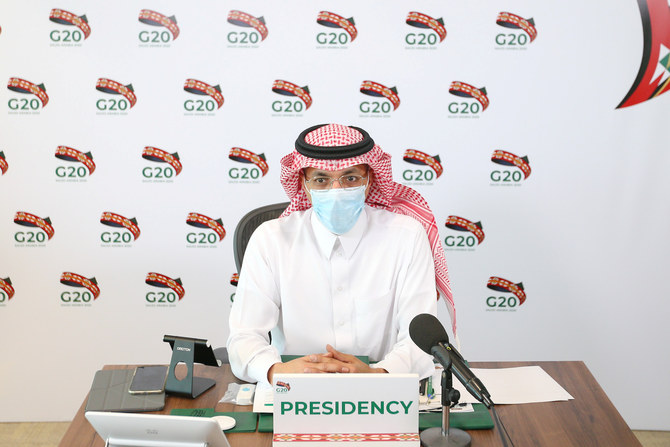RIYADH: Saudi Arabia led the major economies of the G20 on Saturday in pledging to use “all available policy tools” to combat the coronavirus pandemic and boost the global economy.
After a virtual meeting hosted by Riyadh, the group’s finance ministers and central bank chiefs said the global economy would recover as countries reopened after virus lockdowns, but further actions were needed to ensure growth.
“We are determined to continue to use all available policy tools to safeguard people’s lives, jobs and incomes, support global economic recovery, and enhance the resilience of the financial system, while safeguarding against downside risks,” they said in a statement.
They said they will consider widening debt relief for coronavirus-hit poor countries in the second half of 2020.
The world's 20 most industrialized nations announced a one-year debt standstill for the world's poorest nations in April, but campaigners have criticized the measure as grossly inadequate to stave off the knock-on effects of the pandemic.
World Bank president David Malpass called for the debt suspension initiative to be extended through the end of 2021, while multiple charities including Oxfam said it needs to be stretched through 2022 to avert a "catastrophe for hundreds of millions of people".
G20 finance officials said 42 of the world’s 73 poorest countries had asked for a freeze in debt repayments until the end of the year, amounting to about $5.3 billion in deferred payments.
Any extension of the initiative will be based on how the pandemic develops and recommendations of the International Monetary Fund and World Bank that will be submitted to G20 members in advance of their meeting in October, it added.
Saturday's talks, chaired by Saudi Finance Minister Mohammed Al-Jadaan and central bank governor Ahmed Al-Kholifey, came as the surging pandemic continues to batter the global economy and campaigners warn of a looming debt crisis across poverty-wracked developing nations.
Al-Jadaan said: “We encourage the private sector investors to participate in this, but we need to be very careful not to interfere in private agreements.”
Downgrading its growth forecasts, the IMF last month said it expected global GDP to fall by 4.9 percent this year due to a deeper contraction during lockdowns than previously anticipated.
"Due to the continuing impact of the COVID-19 pandemic, the global economy faces a deep recession this year, with partial and uneven recovery expected in 2021," Kristalina Georgieva, the
IMF's managing director, said in a statement after the meeting.
"We need to unite to help the poorest and most vulnerable economies, especially those struggling with high debt... The G20's debt service suspension initiative has been commendable and I hope that consideration will be given to extending it."
French Finance Minister Bruno Le Maire also called on the G20 to extend the debt service suspension in order to "give the poorest countries the means to overcome (the crisis)."
Despite the G20's initiatives so far, 73 of the world's poorest countries are still required to pay up to $33.7 billion in debt repayments through the end of the year, the charities Oxfam, Christian Aid and Global Justice Now said in a research report released on Thursday.
"The global economy has been hit harder by the coronavirus than the already dire predictions we saw in April -- the G20 finance ministers have the mandate to avert an impending catastrophe for hundreds of millions of people," said Chema Vera, Oxfam's interim executive director.
"They must make (the initiative) legally binding to cancel all debt payments, including private and multilateral, through the end of 2022 and also include middle-income countries," he added.
"An eight-month freeze on bilateral debt alone does not come close to freeing up enough cash or time for the world's poorest countries to cope with the pandemic and its effects."
Amnesty International also called on G20 nations to "cancel the debt owed by the poorest countries for at least the next two years".
"COVID-19 has exposed the glaring inequalities that exist in our world," said Julie Verhaar, Amnesty's acting secretary-general.
"If we are to build resilience to future crises, we need to make long-term structural changes that will require courage and leadership from G20 countries."
But G20 nations are themselves scrambling to defend their virus-wracked economies amid forecasts of a deepening recession.
Last month, the Organization for Economic Co-operation and Development (OECD) said measures to curtail the disease caused a record 3.4 percent drop in GDP for G20 economies in the first three months of 2020.
That marks the biggest decline since the Paris-based agency began compiling data in 1998.
(With AFP)




























